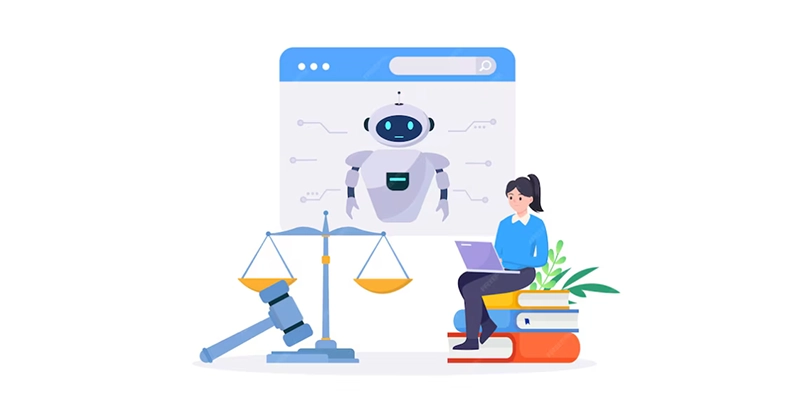Contents
Generative AI refers to artificial intelligence that can generate text, images, or other data-based outputs. Unlike traditional AI, which follows pre-programmed rules, Generative AI learns from patterns and produces human-like results. In legal settings, it can automate complex processes, including billing, by analyzing past data and predicting trends.
Traditional Law Firm Billing Models
Most law firms rely on three main billing models:
- Hourly billing: The most common approach but often criticized for inefficiencies and unpredictable costs.
- Flat-fee billing: A fixed price for services, offering transparency but requiring accurate forecasting.
- Contingency fees: Based on case outcomes, used mainly in personal injury and litigation cases.
Each method has limitations—hourly billing can be error-prone and inefficient, while flat-fee structures require careful cost estimation. Generative AI is transforming billing by making it faster, more accurate, and more client-friendly.
The Role of Generative AI in Billing
Law firms are increasingly adopting Generative AI in Law Firms for billing tools to eliminate inefficiencies and improve cost transparency. Automated time tracking, predictive billing models, and AI-generated invoicing allow firms to save time, increase revenue, and build trust with clients. These advancements are shifting legal billing toward a more data-driven, value-based approach.
Automated Time Tracking and Analysis
AI-powered time tracking revolutionizes how law firms manage billable hours by automating the detection of work-related activities across emails, calls, and documents, ensuring firms do not overlook billable time. Unlike manual timekeeping, which is prone to errors and time-consuming, Generative AI in Law Firms streamlines invoicing, reduces revenue leakage, and enhances accuracy.
AI simplifies time tracking and improves efficiency by analyzing project data, identifying patterns, and generating reports with minimal manual intervention. Generative AI in Law Firms enables automated time reports that provide weekly productivity metrics, helping firms identify inefficiencies in case management.
Additionally, AI minimizes human error by eliminating manual entry mistakes, ensuring precise billing and compliance. This automation enhances accuracy and optimizes resource allocation, allowing legal professionals to focus more on casework than administrative tasks.
Predictive Billing Models
Imagine knowing exactly how much a case will cost before you start. Generative AI enables predictive billing models by analyzing:
- Historical case data – Uses previous matters to estimate total fees.
- Client engagement patterns – Predicts time spent based on past interactions.
- Resource allocation – Optimizes team workload by forecasting legal efforts.
For clients, this means fewer surprises. For lawyers, it means data-backed pricing confidence. Generative AI in Law Firms ensures AI-based billing estimates can be a negotiation tool when discussing pricing with clients, helping to build trust and transparency from the outset.
Streamlined Invoice Generation
Invoice creation is often slow and prone to errors. AI eliminates these issues by automating invoice generation, tracking payments, and sending follow-ups. Ai implementation ensures faster payments, fewer disputes, and improved cash flow management.
- Automated invoice creation – No more manual calculations.
- Faster processing – Clients receive invoices instantly.
- Seamless accounting integration – Syncs with financial software for error-free records.
Generative AI in Law Firms ensures steady and predictable cash flow. AI-powered reminders and follow-ups gently nudge clients on overdue payments, improving cash flow without requiring manual effort.
Key Benefits and Challenges
Generative AI in Law Firms enhances efficiency, accuracy, and compliance, making legal financial management more reliable and transparent. By automating administrative tasks, AI streamlines invoicing, reduces errors and provides real-time insights that help law firms optimize pricing and resource allocation. Transparent and predictable fees build client trust, while AI ensures billing aligns with ABA guidelines and ethical standards.
- Faster Billing Cycles – AI eliminates redundant admin work, expediting payments.
- Improved Client Satisfaction – Clear, predictable billing fosters trust and transparency.
- Data-Driven Decision-Making – AI-powered insights help optimize pricing and workload.
- Enhanced Compliance – Automated tracking ensures adherence to ethics rules and legal standards.
Review AI-generated reports weekly to assess billing efficiency and identify optimization opportunities.
Challenges & Considerations
While Generative AI in Law Firms offers transformative benefits, firms must ensure responsible implementation. Over-reliance on automation, data privacy concerns, and AI model bias require careful oversight. Legal billing AI must comply with confidentiality regulations and maintain accuracy to avoid ethical pitfalls.
- Human Oversight is Essential – AI should enhance, not replace, human review.
- Ensure Data Security – AI tools must meet strict confidentiality and compliance requirements.
- Monitor for AI Bias – Regularly audit AI models to prevent inaccuracies or unfair billing practices.
Conduct monthly audits of AI-generated invoices and time logs to ensure compliance, accuracy, and ethical billing.
Dedicated Subsection: How RunSensible Helps Law Firms
Billing and financial management can be time-consuming and prone to errors, often diverting valuable time from client work. RunSensible simplifies these processes with AI-powered automation, ensuring accurate invoicing, financial tracking, and timekeeping. Whether using hourly billing, flat fees, or contingency models, law firms can streamline operations, reduce administrative burdens, and improve efficiency.
Seamless Integration of AI Modules
RunSensible eliminates inefficiencies in legal billing by consolidating invoices, payments, and financial tracking into a centralized dashboard. With intelligent invoicing, the system ensures accurate billing structures, tax calculations, and automatic payment reminders, reducing disputes and improving cash flow.
Key benefits of AI integration include:
- Automated payment reminders to prevent late payments.
- Accounting software synchronization for seamless financial management.
- Real-time financial tracking for instant revenue insights.
By automating billing tasks, law firms can focus more on their legal work and less on financial administration.
Time Management and Billing Made Easy
RunSensible’s AI-powered time tracking eliminates the need for manual time entries, ensuring billable hours are accurately logged across emails, calls, and casework. This reduces errors and revenue loss while simplifying invoicing.
Additional billing features include:
- Automatic invoice generation for client-ready invoices.
- Customizable fee structures for different pricing models.
- Tax calculation and compliance to simplify accounting.
By streamlining both time tracking and invoicing, RunSensible reduces administrative workload, improves billing accuracy, and accelerates payments—allowing legal professionals to focus on delivering legal expertise without the hassle of managing invoices.
Real-World Examples
Case Study of Early Adopters
One notable example of a law firm successfully implementing Generative AI in Law Firms for billing is PNC Bank’s legal department, which adopted the LegalVIEW BillAnalyzer solution. This AI-powered tool transformed their legal bill review process by automating compliance checks against billing guidelines.
Measurable Outcomes:
- Increased Compliance: Within the first month of implementation, PNC Bank experienced a 20% increase in billing guideline compliance.
- Cost Savings: The integration of AI not only streamlined workflows but also led to substantial cost reductions in legal spending. The firm reported that the efficiencies gained allowed them to manage their legal budgets more effectively.
- Enhanced Collaboration: The AI tool fostered better collaboration with external vendors, improving overall engagement and transparency in the billing process.
The success of this implementation illustrates how Generative AI in Law Firms can yield positive ROI by enhancing compliance, reducing costs, and improving operational efficiency in legal billing practices.
Lessons Learned
When adopting Generative AI solutions in law firms, several common pitfalls should be avoided.
One of the most significant challenges is Lack of Clear Objectives. Firms should establish well-defined goals for what they hope to achieve with AI adoption. Without clear objectives, measuring success and ROI becomes difficult, leading to inefficiencies in implementation.
Another crucial factor is Underestimating Change Management. Implementing AI requires substantial changes in workflows and processes. Firms must actively engage their staff and provide comprehensive training to ensure smooth transitions and buy-in from all team members.
- Neglecting Data Quality: The effectiveness of AI tools heavily depends on the quality of data inputted into the system. Law firms should prioritize strong data management practices to ensure that AI operates optimally and delivers accurate results.
Ignoring client communication is another common mistake. As billing practices evolve with AI integration, firms must communicate changes transparently with clients. This includes explaining how AI impacts billing structures and ensuring that clients understand the value being provided.
- Overlooking Ethical Considerations: Firms must remain mindful of ethical guidelines regarding billing practices when integrating AI. Striking a balance between leveraging technology and maintaining professional standards is essential to uphold client trust.
By learning from these experiences and avoiding common pitfalls, law firms can effectively utilize Generative AI to enhance their billing practices while delivering greater value to clients.
The Future of AI in Legal Billing
AI is not just streamlining billing—it’s transforming how law firms manage financial operations. Firms that embrace Generative AI in Law Firms now will gain efficiency, improve revenue predictability, and enhance client satisfaction.
- More accurate time tracking
- Faster payment processing
- Stronger client relationships through transparency
The future of legal billing is AI-driven, data-backed, and client-focused. Stay ahead of the curve by attending AI and legal tech webinars to keep up with the latest automation advancements.
Ready to streamline your firm’s billing? Book a demo of RunSensible and see how AI can automate tasks, improve accuracy, and enhance billing transparency. It saves time on admin work, letting you focus on clients. Plus, AI-driven insights optimize pricing and boost efficiency.
FAQs
1. What is Generative AI, and how does it help law firms with billing?
Generative AI is a type of artificial intelligence that can generate text, images, and other data-based outputs. In law firms, it helps automate billing by tracking work activities, predicting case costs, and generating invoices, making billing more accurate and efficient.
2. How does AI improve transparency in legal billing?
AI eliminates manual errors, provides real-time cost estimates, and ensures predictable billing structures. This makes legal fees more transparent for clients and helps build trust between law firms and their clients.
3. Is Generative AI in legal billing secure and ethical?
Yes, when implemented correctly, AI follows data security protocols and compliance guidelines. However, firms must regularly audit AI-generated invoices to ensure accuracy, prevent bias, and maintain ethical billing practices.
4. How does Generative AI optimize resource allocation in law firms?
Generative AI analyzes historical case data, client engagement patterns, and workload distribution to forecast legal effort. This helps law firms allocate resources efficiently, preventing overuse or underutilization of billable hours.
5. What are the key compliance considerations when implementing AI-driven billing in a law firm?
Firms must ensure AI systems comply with data protection laws (e.g., GDPR, HIPAA) and legal industry standards, such as ABA billing guidelines. Regular audits should be conducted to prevent inaccuracies, AI bias, and ethical concerns.
6. What are the biggest challenges law firms face when transitioning to AI-powered billing?
The main challenges include resistance to change from legal professionals, ensuring AI-generated invoices comply with ethical guidelines, maintaining data privacy, and accurately training AI models with high-quality billing data.
Disclaimer: The content provided on this blog is for informational purposes only and does not constitute legal, financial, or professional advice.







